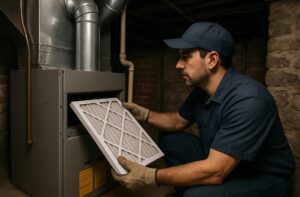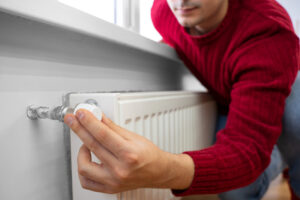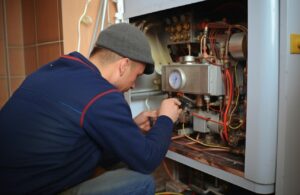When a strange smell starts drifting from your furnace, it’s hard to ignore. Many homeowners in Phoenix experience this issue, especially during the first few uses of the season. It’s easy to think the smell will just pass, but certain odors can signal bigger problems that shouldn’t be brushed aside. Whether your system is older or recently installed, ignoring unusual smells can lead to safety concerns or costly repairs.
In Phoenix, where the furnace doesn’t run all year long, catching odd smells early matters a lot. Since furnaces sit unused through much of the year, dust buildup or worn-out components can go unnoticed until the next use. Recognizing the different smells and what they might mean is the first step to keeping your system in safe working condition and your home comfortable without unexpected interruptions.
Understanding Common Furnace Smells
Strange furnace smells can mean different things based on what they smell like and when they appear. Some odors can be harmless and temporary, while others may need you to act right away. Here’s a breakdown of common smells many Phoenix homeowners report and what they could mean:
1. Burning Dust
If you notice a dusty burning smell the first time you turn your furnace on, it’s likely due to dust that has gathered on the burners or internal parts over months of non-use. This smell should clear out within an hour or so. If it lingers, it could mean the furnace is struggling to vent properly.
2. Rotten Eggs or Sulfur
This is a serious warning sign. A rotten egg smell points to a possible gas leak, especially if your home uses natural gas for heating. If this happens, shut off the furnace, leave the property, and seek professional help right away.
3. Burning Plastic or Metallic Odors
If you detect a chemical-like or metallic scent, it may suggest overheating components or wiring issues. Loose or overworked parts can cause insulation to burn, which gives off these types of smells.
4. Oil or Smoky Smells
More common in homes with oil-based heating, this smell can indicate a clogged filter or soot buildup. In newer systems, it could also stem from the furnace not burning fuel properly, which should be fixed right away.
By knowing what each smell might mean, you’ll be better prepared to describe the issue when calling for help. Keeping track of how long the smell lasts can also give clues about the severity of the problem.
Causes of Strange Furnace Smells in Phoenix Homes
With Phoenix homes relying on heating mostly during cooler months, it’s common for furnace smells to show up during startup or after a recent furnace installation. Here are a few typical causes:
– Dust Accumulation
Long dry seasons and limited furnace use mean dust builds on burners, vents, and internal parts during the off months.
– Clogged or Dirty Filters
When the filter gets packed with dust, airflow reduces and the furnace starts to overheat. This may cause burnt dust or even a musty smell.
– Gas Connection Issues
After a new furnace installation in Phoenix, fittings and connections may still need settling. If a faint gas smell appears, even once, it needs to be checked.
– Electrical Malfunctions
Wiring that gets too hot can emit plastic or smoke-like smells. Often, this means the system is pushing too hard or has a broken component.
– Moisture or Mold Inside Ductwork
Unusual smells might drift from ducts instead of the furnace itself. This can come from trapped moisture allowing mold to grow, especially in areas not getting much ventilation.
Phoenix homes deal with unique challenges due to climate and how often heating systems are used. That’s why it’s important to keep an eye and nose out for these changes, especially when your system kicks on after sitting dormant for months. Most odors will need a professional’s attention to fully diagnose and repair.
Steps to Take When Detecting Strange Smells
When you notice a strange smell coming from your furnace, acting quickly can prevent larger problems. Even if the odor fades, there’s often something behind it that’s worth looking into. Homeowners in Phoenix deal with dry weather and long off-seasons for heating, which makes these smells easier to miss until the furnace turns back on. Here’s what to do right away if something smells off:
– Turn off your furnace. If the smell is strong or makes you feel lightheaded, shut the system down immediately.
– Check for visible problems. Look around the furnace for signs of overheating, glowing parts, or melted wires. Don’t touch any damaged parts.
– Swap out dirty filters. A clogged filter can overheat your system and trap odors. Replacing it might ease the smell and improve airflow.
– Ventilate the area. Open windows or doors to push out any lingering fumes.
– Leave the house if needed. If the smell is sharp, like gas or chemicals, it’s safest to head out and wait for help.
– Don’t attempt repairs. Furnaces have electrical and fuel-based components that can be dangerous unless handled by trained professionals.
Phoenix homeowners often downplay odors, especially if the furnace hasn’t been used in months. But getting ahead of odd smells avoids safety risks and helps keep repair costs down. The goal isn’t to panic, but to notice when something isn’t right and then reach out for professional help.
Why a Professional Inspection Matters
Strange furnace smells may signal something simple like an overdue cleaning, or something more serious like a loose gas connection or a failing motor. Without the right tools, there’s often no way to know which it is. That’s why calling on our professionals becomes important. They don’t just mask the smell. They find the source, inspect surrounding components, and restore safe operation.
Our technicians are trained to catch early signs of trouble before they get worse. If a furnace installation in Phoenix wasn’t sealed correctly, our technicians can identify it. If wires are starting to wear, they can fix the issue before it affects other parts. Even lingering dust smells that won’t go away may trace back to poor air quality, cracked heat exchangers, or problems in the ductwork.
During an inspection, our technicians can:
– Measure airflow and temperature
– Check for gas or electrical leaks
– Clean burners, blowers, and vents
– Inspect ductwork for mold or blockage
– Replace worn-out parts with proper fits
Without proper inspection, it’s easy to miss problems. And while some smells disappear for a while, issues like cracked heat exchangers or faulty fans can return and worsen. Letting our technicians assess your system early helps your furnace work through the cooler season and protects your home in Phoenix from unexpected breakdowns.
Keeping Phoenix Homes Safe and Comfortable
Furnace smells can carry more than just an unpleasant odor. They often point to something mechanical, chemical, or structural that needs attention. Whether you’re noticing it right after turning on the heat or days into the season, acting quickly makes a big difference.
Phoenix homes face conditions that speed up dust buildup and put pressure on HVAC systems. Long dry spells, sudden use after months of sitting idle, and seasonal shifts all play a part. Figuring out what these smells mean and how to respond helps prevent small issues from growing into major disruptions.
Even newer systems installed recently can run into problems if components settle incorrectly or ductwork isn’t sealed tightly. By taking early action, making careful inspections, and getting help from our technicians when needed, your system runs better and your home stays safer. Strange smells aren’t something to ignore. They’re often the warning signs your furnace is designed to give.
If you notice any concerning signs around your furnace, don’t hesitate to have our professionals assess the situation, whether it’s the result of dust buildup or a more complex issue affecting your system’s performance. Considering furnace installation in Phoenix may be a smart move to ensure long-term comfort and reliable heating throughout the colder months. Great American Air Conditioning is committed to offering dependable service that puts your home’s safety first. For a quick estimate or to book a service visit, please contact us today.




